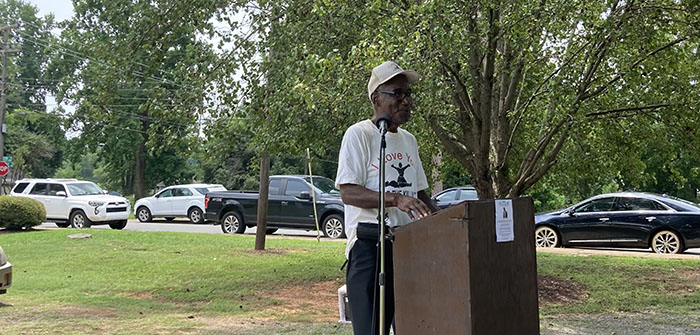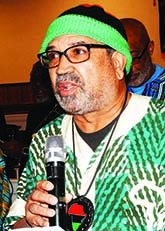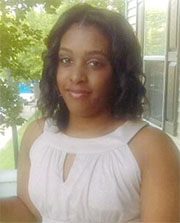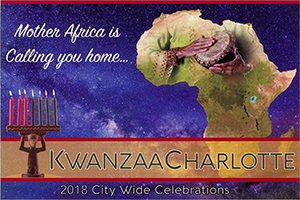
A United Front Needed To Fight Community Violence

By Makheru Bradley

The Reverend James Barnett, the leader of “Stop The Killing Crusade,” Charlotte’s longest standing anti-violence organization, issued a call for a united front of groups to fight the rising tide of crime and violence affecting Charlotte’s Afrikan American community during a program on July 10.
Rev. Barnett’s proposal comes at a time when Charlotte-Mecklenburg Police are reporting 499 shootings into occupied homes and vehicles, a 27 percent increase from this time last year. These unconscionable and cowardly crimes, part and parcel of the “tyranny of stray bullets” are taking a devastating toll on the Afrikan American community nationwide.
The Tyranny of Stray Bullets Strike Sister Sherilyn “Alicia” Drew in Charlotte

Such senseless killings not only psychologically traumatize the families and friends of young people like Alicia Drew, the entire Afrikan American community suffers from a loss of potential.
45 homicides through May 2021 compared to 35 through May 2020
There were 123 homicides in Charlotte in 2020, making it the deadliest year on record. CMPD has adjusted the previous record of 129 homicides in 1993 down to 122. Over a period of just two weeks, June 26—July 7 there were eight homicides in Charlotte, mostly in areas that are predominately Black. Rev. Barnett calls this an embarrassment for a city/county with a Black mayor; with its third consecutive Black police chief; a Black sheriff; a Black chairman of the Mecklenburg Board of County Commissioners; a Black district attorney; a Black city manager, and a host of other Black politicians and city leaders. In fact, many of us see white county commissioner Pat Cotham at more rallies against community violence than we see our Black elected officials.
“Stop The Killing” Launched
Rev. Barnett talked about his moment of self-reflection while in Nicaragua in 1986, during the war between the Contras and the Sandinistas. He asked himself, why am I here when people are dying in my own community in Charlotte. We should note that CIA-facilitated crack cocaine, flowing from the Contras into Black communities in the US, was fueling the violence of the 1980s-90s. After returning from Nicaragua, Barnett launched the “Stop The Killing Crusade,” which included among other activities nighttime marches into communities where drugs were being sold in open air markets. Such bold maneuvers gained support and the crack epidemic eventually subsided and with it a decrease in homicides. By 2005, homicides in Charlotte had fallen from 122 in 1993 to 49 in 2005.
The Homicide Spike
Charlotte began to see an increase in homicides in 2015 with 62 which included five killed on Labor Day weekend. Of those 62 victims, 44 (70 percent) were Afrikan Americans, who comprise about 35 percent of Charlotte’s population. Charlotte homicides increased to 69 in 2016, and increased again in 2017 to 87, which was the highest total since 1995. Homicides in Charlotte decreased in 2018 to 57, but exploded to 107 in 2019. Charlotte is on pace to exceed 100 homicides again in 2021.
The New York Times reported that homicide rates in America’s large cities were up more than 30 percent on average in 2020, and are up another 24 percent for the first 5 months of 2021. This should be a national disgrace, but it isn’t.
Unlike the crack epidemic of the 1990s, criminologists have not identified the major factor for the current homicide increase, but the opioid epidemic of the 21st century has to be one reason. More guns in the hands of undisciplined and unconscionable people are also a factor.
When Do Black Lives Matter?
From the very beginning of his crusade Rev. Barnett has always called out Afrikan Americans for not responding with equal moral outrage when lives are lost to community violence, compared to lives lost to police violence.
Certainly moral outrage is justified people witness the public lynching of George Floyd, or when we learn about the home invasion that killed Breonna Taylor. All too often police officers are never even charged by state or federal officials when they gun down a 12-year-old like Tamir Rice.
The killings of people like Alicia Drew, Jaylon Webber, Cinquay and Dayvon Farrer are rarely filmed, and when caught, the killers are often convicted. However, these convictions have not stopped the scourge of violence affecting Afrikan Americans. In 2015, The Atlantic reported that since 1980, more than 260,000 Black men have been killed in the United States.
The response disparity reflects a fragmented consciousness. It’s not an either-or response situation. It’s both. The words of Dr. Martin L. King should be the mantra for those who want to stop killings: “Injustice anywhere is a threat to justice everywhere. We are caught in an inescapable network of mutuality, tied in a single garment of destiny. Whatever affects one directly, affects all indirectly.”
Violence prevention should be the priority
There is also a need for people involved in this struggle to have a thorough understanding of the root causes of community violence. Two books by Dr. Amos Wilson provide a detailed analysis of this problem and should be required reading for everyone involved: (1) Black-On-Black Violence: The Psychodynamics of Black Self-Annihilation in Service of White Domination (2) Understanding Black Adolescent Male Violence: Its Remediation and Prevention. The city of Charlotte is funding violence intervention programs. The priority should be funding violence prevention programs which help to create the culture and consciousness that thwarts the lures of crimogenic America.
Rev. Barnett’s call for a united front should be heeded
There is a core of committed activists spread across several organizations, who are in the struggle to stop the violence affecting Afrikan Americans. It makes sense that these groups should support one another. They can engage in operational unity without losing their autonomy. Small rallies and programs would become larger and more effective. The leaders of these groups should meet and work this out. As Rev. Barnett always says, “no one can save us, but us.”
For more from the author, follow his blog Makheru Speaks.


